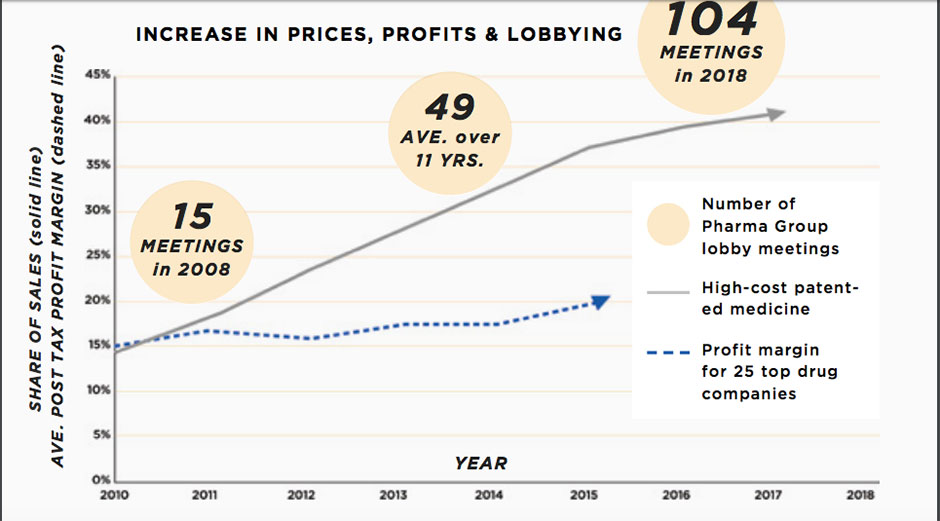
‘Deep-Pocketed’ Lobby Groups Are Trying to Stop Universal Pharmacare in Canada, New Report Warns
Big pharmaceutical and major insurance corporations are lobbying the Liberal government to maintain the status quo
A new report by the Canadian Federation of Nurses’ Unions shows how powerful lobbyists from the pharmaceutical and private insurance companies are pressuring the federal government to stop universal pharmacare in Canada.
Canada is the only industrialized country in the world with universal healthcare that doesn’t also provide a universal drug plan. As a result, while private insurers cover 36% of drug costs, many patients pay deductibles and co-payments out-of-pocket. CFNU found 640 Canadians die yearly under the current, multi-player system, due to financial barriers to medication.
The report notes “decades of study” agree “pharmaceutical drugs should be part of the universal and publicly-funded national health care system.” But, in response to that pressure, industry is pushing back and offering a weaker, “fill-in-the-gaps” substitute.
According to the report, powerful corporate lobby groups like Innovative Medicines Canada and the Canadian Life and Health Insurance Association, which count Canada’s pharmaceutical and insurance giants as members, advocate a multi-payer, fill-in-the-gaps drug coverage system.
Under a fill-in-the-gaps system the government provides limited support for some patients on a means-tested basis.
The report tracked data revealing the annual number of big pharma lobby group meetings increased from 15 in 2008, to 104 in 2018 – the same year the federal government launched the Advisory Council on the Implementation of National Pharmacare. During that period, drug costs and profit margins for Canada’s top 25 pharmaceutical companies steadily increased.

CFNU
“Flush with resources,” the report explained, “they (corporations) are buying influence through lobbying and advertising, enlisting a suite of industry-linked think tanks and commentators to create an echo-chamber of validators and calling on the U.S. administration for help.”
Facing industry pressure, the federal liberals have put forward a similar proposal.
Finance Minister Morneau promised, last year, to explore a national pharmacare program, but quickly ruled out implementing a universal, single-payer system, despite recommendations from Canada’s leading healthcare experts to do so.
Morneau told the Economic Club of Canada “we recognize that we need a strategy to deal with the fact that not everyone has access and we need to do it in a way that’s responsive – that deals with the gaps and that doesn’t throw out the system we currently have.”
Some health experts noted Morneau’s former company, Morneau Shepell, was involved in private health and benefits consulting, with Morneau bragging “my firm (Morneau Shepell) was the largest provider of benefits consultancy services in Canada.”
This prompted Canadian Doctors For Medicare and others to suggest, in an open letter, the Finance Minister may have a conflict of interest.
The CFNU report noted the current multi-payer system allows “gargantuan price differences” between medicines that are roughly equivalent:
“without the effective regulation and discipline of a single-payer system, price inflation such as this will continue to exist to the benefit of pharmaceutical company revenues.”
CFNU President Linda Silas told PressProgress a fill-the-gaps system bolsters profits for big corporations and drives up costs for consumers. That’s because public dollars pay for only small groups of patients, weakening the government’s bargaining power.
“When you’re only buying for a small pool, it costs you a lot more. When you’re administrating plans, it costs a lot more,” Silas said. “With fill in the gaps, it’s simply increasing the number of private plans that we already have.”
University of Toronto professor Dr. Danyaal Raza told PressProgress a fill-in-the-gaps approach “entrenches our current, broken system,” and allows many existing problems to grow worse. “It leaves in place a dysfunctional relationship with the pharmaceutical industry and will do little to control unsustainable drug costs.”
Correction: This story originally stated Canada is the only industrialized country with universal healthcare that doesn’t also provide “single-payer pharmacare.” In fact, a more accurate description of the information cited is that Canada doesn’t offer a “universal” drug plan.
Our journalism is powered by readers like you.
We’re an award-winning non-profit news organization that covers topics like social and economic inequality, big business and labour, and right-wing extremism.
Help us build so we can bring to light stories that don’t get the attention they deserve from Canada’s big corporate media outlets.
Donate



